
AMPHIBIA-REPTILIA
metrics 2024
Championing Peer-Reviewed Research for Ecological Progress
Introduction
AMPHIBIA-REPTILIA, published by BRILL, stands as a prominent journal in the field of zoology and ecology, specializing in herpetology, the study of amphibians and reptiles. With a rich history since its inception in 1980, this journal aims to disseminate high-quality, peer-reviewed research that advances our understanding of these vital vertebrate groups. Holding a commendable 2023 Q2 ranking in both Animal Science and Zoology and Ecology, Evolution, Behavior and Systematics, it is recognized for its contributions to the scientific community. Researchers are encouraged to submit their manuscripts, benefiting from the journal's commitment to academic excellence, which is showcased in its operational transparency and rigorous editorial process. Though currently not open access, the journal's findings are pivotal for advancing conservation efforts and ecological studies, making it an essential resource for scholars, professionals, and students invested in these important fields.
Metrics 2024
 0.49
0.49 1.00
1.00 1.50
1.50 52
52Metrics History
Rank 2024
Scopus
IF (Web Of Science)
JCI (Web Of Science)
Quartile History
Similar Journals

SALAMANDRA
Connecting Researchers in the World of HerpetologySALAMANDRA is a distinguished journal published by the Deutsche Gesellschaft Herpetologie und Terrarienkunde e.V., focusing on herpetology and related ecological studies. With an ISSN of 0036-3375, this journal has consistently contributed to the understanding of amphibians and reptiles, solidifying its reputation in the fields of Animal Science and Zoology and Ecology, Evolution, Behavior and Systematics. As of 2023, SALAMANDRA proudly holds a Q2 category ranking in both categories, indicating its significant impact within the academic community, with a Scopus rank of 141 out of 490 in Animal Science and Zoology and 286 out of 721 in Ecology. Although it does not operate under an Open Access model, researchers, professionals, and students can benefit from a wealth of peer-reviewed articles that delve into critical topics, methodologies, and discoveries in herpetological research. Established in 2008, SALAMANDRA continues to serve as an essential platform for the dissemination of knowledge and innovation in herpetology, fostering collaboration and advancement within this vibrant field.
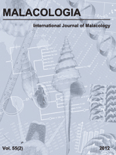
MALACOLOGIA
Pioneering Insights into Molluscan Diversity and EcologyMALACOLOGIA, an esteemed journal published by the INST MALACOL, serves as a vital platform for advancing knowledge and research in the fields of malacology, ecology, and zoology. Established in the United States, this journal has been contributing to the scientific community since its inception, encompassing an array of converged years from 1971 through to 2022, with ongoing publications planned for 2024. With a Q3 category ranking in both Animal Science and Zoology as well as Ecology, Evolution, Behavior and Systematics in 2023, it holds significant relevance for researchers seeking to publish their work in a reputable outlet. Although Open Access options are currently not available, the journal maintains a robust academic standard and impact within its categories, as evidenced by its Scopus rankings. Researchers, professionals, and students alike will find this journal invaluable for its rigorously peer-reviewed content and commitment to enhancing our understanding of mollusks and related ecological interactions.

Asian Herpetological Research
Connecting researchers to the heart of herpetology in Asia.Asian Herpetological Research, published by SCIENCE PRESS, stands as a vital resource in the field of herpetology, focusing on the comprehensive study of amphibians and reptiles across Asia. With a distinct ISSN of 2095-0357 and an E-ISSN of 2095-0357, the journal has established itself as a leading publication since its inception in 2011, converging its contributions towards fostering knowledge until 2024. Recognized for its academic rigor, it holds a commendable Q2 quartile ranking in the 2023 categories of Animal Science and Zoology, with a significant 67th percentile placement among its peers in Scopus Rankings. Although Asian Herpetological Research is not an open-access journal, it provides essential insights for researchers, professionals, and students invested in wildlife conservation, ecological studies, and biodiversity. As the journal continues to advocate for the advancement of herpetological studies, it remains a cornerstone for scholarly dialogue and research dissemination within the vibrant scientific community of Asia.

AMPHIBIAN & REPTILE CONSERVATION
Exploring Solutions for Amphibian and Reptile SurvivalAMPHIBIAN & REPTILE CONSERVATION, published by the Amphibian Conservation Research Center & Lab, is a leading journal dedicated to the field of herpetology and environmental conservation. With an ISSN of 1083-446X and an E-ISSN of 1525-9153, this journal serves as a vital resource for researchers, conservationists, and students interested in the preservation of amphibian and reptile species. The journal has achieved remarkable rankings, categorized in the Q2 quartile for Animal Science and Zoology, Ecology, and Nature and Landscape Conservation as of 2023, reflecting its significant contribution to the scientific community. Over the converged years from 2016 to 2024, the journal has established itself as an integral platform for disseminating research findings, fostering collaboration, and enhancing the understanding of biodiversity and ecosystem dynamics. By embracing an open-access approach, AMPHIBIAN & REPTILE CONSERVATION ensures that critical research is readily available to a global audience, promoting informed conservation efforts and policy advocacy to safeguard these vital species amidst their declining populations.
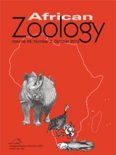
AFRICAN ZOOLOGY
Celebrating the Diversity of Animal LifeAFRICAN ZOOLOGY, published by Taylor & Francis Ltd, stands as a significant journal in the realm of Animal Science and Zoology, with a proud history dating back to 1996 and slated to continue until 2024. With an ISSN of 1562-7020 and E-ISSN 2224-073X, this journal provides a reputable platform for researchers and practitioners dedicated to the study of animal biology across the African continent. It has been recognized for its quality scholarship, evidenced by its Q3 categorization in the 2023 Scopus quartile rankings and an impressive rank of #182 out of 490 within its field. As an open-access journal, it facilitates the dissemination of vital research findings and promotes broader accessibility, catering to a diverse audience of professionals, scholars, and students alike. The journal aims to enhance our understanding of wildlife, conservation, and ecosystem dynamics in Africa, fostering collaborations that address critical ecological challenges. For researchers and enthusiasts keen on contributing to and staying informed about advancements in zoological science, AFRICAN ZOOLOGY is an essential resource that enriches the global discourse on biodiversity and conservation efforts.
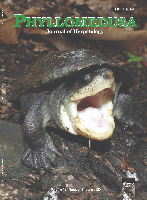
PHYLLOMEDUSA
Empowering researchers to share groundbreaking zoological insights.PHYLLOMEDUSA is a distinguished, peer-reviewed journal dedicated to the fields of Animal Science and Zoology and published by UNIV SAO PAULO, ESALQ in Brazil. With an Open Access model in place since 2002, PHYLLOMEDUSA provides a vital platform for the dissemination of research findings, ensuring that quality scholarly articles are freely accessible to a global audience. The journal currently holds a Q3 classification in its category and ranks #375 out of 490 in Scopus, reflecting its commitment to fostering scientific dialogue and advancing knowledge within the community. Covering a diverse range of topics related to amphibian biology, ecology, and conservation, the journal invites contributions from researchers and professionals alike, empowering them to share innovative insights and collaborative studies that address contemporary challenges in zoological sciences. With a converged publishing timeline extending from 2005 to 2024, PHYLLOMEDUSA remains a pivotal resource for academics, students, and practitioners eager to stay abreast of the latest developments in the field.
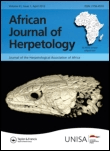
AFRICAN JOURNAL OF HERPETOLOGY
Advancing Knowledge in Reptile and Amphibian ResearchThe AFRICAN JOURNAL OF HERPETOLOGY, published by TAYLOR & FRANCIS LTD, serves as a pivotal resource in the field of herpetology, encompassing the study of reptiles and amphibians. With an ISSN of 2156-4574 and an E-ISSN of 2153-3660, this journal offers a platform for researchers to disseminate their findings and advance knowledge in this dynamic area of biology. Recognized in 2023 with a category quartile ranking of Q2 in Animal Science and Zoology and Q3 in Ecology, Evolution, Behavior, and Systematics, the journal highlights impactful research to a global audience. By providing access to robust, peer-reviewed content, the journal contributes significantly to ongoing debates and discoveries, thus appealing to academics, professionals, and students alike. The journal's converged publication years, spanning from 1996 to 2000 and from 2002 to 2024, signify a long-standing commitment to the field, ensuring that emerging trends and critical issues in herpetology remain at the forefront. Engaging with this journal not only enhances your understanding of amphibian and reptile biology but also connects you to a community dedicated to the conservation and sustainable management of these vital species.

POPULATION ECOLOGY
Exploring the intricate dynamics of species and ecosystems.Population Ecology is a leading journal dedicated to the advancement of research in the field of ecology, evolution, and behavior, published by the esteemed Wiley in Japan. With an impact factor indicative of its academic significance and ranked Q2 in the 2023 Ecology category, this journal serves as a pivotal resource for researchers, professionals, and students alike, facilitating the dissemination of high-quality research and innovative discussions. Covering diverse aspects of ecological dynamics, population processes, and their evolutionary implications, Population Ecology fosters a deeper understanding of species interactions and environmental factors shaping ecosystems. Available in both print and online formats (E-ISSN 1438-390X), the journal is committed to open access to enhance public engagement and accessibility to crucial scientific findings, ultimately contributing to informed decision-making regarding biodiversity and conservation efforts. With a robust ranking of #235 out of 721 in Agricultural and Biological Sciences, it is poised to remain at the forefront of ecological research through 2024 and beyond.
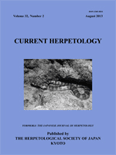
CURRENT HERPETOLOGY
Illuminating the path of herpetological science with impactful studies.CURRENT HERPETOLOGY is a leading journal dedicated to the study of reptiles and amphibians, published by the Herpetological Society of Japan in collaboration with the Graduate School of Science at Kyoto University. With its ISSN 1345-5834 and E-ISSN 1881-1019, this journal serves as a vital platform for sharing significant research findings in the field of herpetology. The journal has been continuously contributing to the scientific community since its inception in 2000, with a scope that embraces diverse topics including ecology, behavior, conservation, and physiology of herpetofauna. Recognized for its scholarly impact, CURRENT HERPETOLOGY holds a commendable position within the Q3 quartile in the Animal Science and Zoology category, ranking 350 out of 490 according to Scopus metrics. Although it is not currently an open-access journal, it caters to an audience comprising researchers, professionals, and students looking to deepen their understanding and engage with cutting-edge studies. Based in Japan, at the Department of Zoology in Kyoto, this journal is poised to foster advancements in herpetological research and promote global collaboration in this vital area of science.
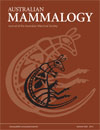
AUSTRALIAN MAMMALOGY
Illuminating the Interactions of Mammals and Their EcosystemsAustralian Mammalogy, published by CSIRO PUBLISHING, is a pivotal journal in the fields of Animal Science and Zoology as well as Ecology, Evolution, Behavior and Systematics. With its ISSN 0310-0049 and E-ISSN 1836-7402, this esteemed journal has been instrumental in disseminating critical research findings since 2000, and continues to evolve up to 2024. Ranked in the Q2 quartile of both its categories for 2023, it showcases a diverse array of studies that contribute to understanding Australia’s unique mammalian fauna and its ecological dynamics. Researchers, professionals, and students will find valuable insights in its peer-reviewed articles, which are essential for advancing knowledge in these essential scientific disciplines. Located in Australia at UNIPARK, Locked Bag 10, Clayton, VIC, this journal remains committed to fostering scholarly communication within the global scientific community.